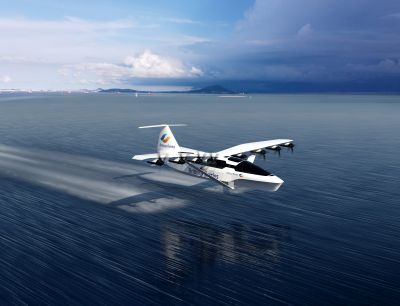Archives
Air, Feature, Freight News, Sea
Portsmouth to Cherbourg in under an hour?
[ June 16, 2021 // Chris ]Brittany Ferries is exploring the potential for a new high-speed form of ferry travel, the 180mph, electric-powered seaglider in conjunction with Boston-based start-up REGENT (Regional Electric Ground Effect Nautical Transport).
The ferry company has signed a letter of intent which could see seagliders with a 50-150 passenger capacity sailing between the UK and France by 2028. However, REGENT expects the first commercial passengers to be travelling on smaller electric craft by 2025.
The route from Portsmouth to Cherbourg could be covered in as little as 40 minutes.
The Seaglider works by harnessing a concept well-known to pilots – ground effect. This is the cushion created by high-pressure air trapped between wings and the ground or water while flying at low altitude. Seagliders are therefore akin to a hovercraft with wings instead of a skirt.
The ground effect will be familiar to anyone who folded a paper aircraft and thrown it through the air. As the paper plane swoops close to the ground, it suddenly appears to get a fresh burst of speed and surges swiftly along, a couple of inches from the ground before finally coming to earth.
The Seaglider concept isn’t entirely a new idea. A rather terrifying machine known as the Ekranoplan was in vogue for a few years in the former Soviet Union to ferry troops across flat, marshy ground flying at treetop height. Some versions, such as the one dubbed the Caspian Sea Monster weighed the best part of 400 tonnes and resembled a propeller aircraft, but with short-stumpy wings.
The Ekanoplan however was fossil-fuel powered. The Seaglider would be electric powered, by batteries and promises to be a much quieter beast.
Passengers would be insulated from the discomfort of choppy waves by a cushion of air, with sensors detecting and automatically avoiding other sea traffic.












